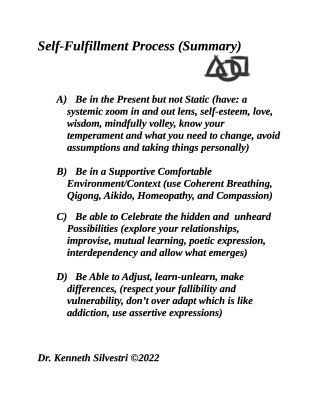Relationships
Steps to an Ecology of Self and Relational Fulfillment
How to make a difference in your life using a wider lens.
Posted December 27, 2022 Reviewed by Vanessa Lancaster
Key points
- You can allow yourself to be in the present with a systemic zooming in and out lens as a basis for self fulfillment
- To enhance a more fulfilling sense of self and relational enjoyment be in the present, in a supportive environment, able to adjust.
- Celebrate all the possibilities that will allow you to experience what it means to be interdependent.
I would like to share a process from my forty years of practicing systemic therapy that has enabled me to help those who want to create “differences that make a difference,” as the late anthropologist Gregory Bateson would say. It is not a model or map, which lacks context, but a guide to better experiencing traveling your unique journey.
Here is where a multitude of possibilities emerge to enhance a more fulfilling sense of self and relational enjoyment.

Be in the Present
Using a wider lens is an ongoing endeavor that creates perspective. It is a commitment to avoid being static. It is a way to go beyond the inevitable double binds we face daily. For instance, imagine that you have immediate access to a built-in camera lens that zooms in and out, a stereoscopic tool to be used whenever you need it.
Use it to view any issue where you may feel stuck or have a personal challenge that is of concern. This lens forms a peripheral understanding of all around you, side to side, up and down, and in and out.
Select a core grievance that you would like to resolve. Take a few deep breaths and relax your body from head to toe. Using all your senses, describe how it affects you at this moment. Now zoom out with your lens, taking note of the many contexts that surround you, your room, family, community, world issues, etc. Ponder how these contexts are interdependent. After a few moments, zoom back into your original concern. In what ways do you now describe it? How may it now be different?
When you create an ecological perspective, as you just did, you can better take an inventory of how your temperament can make use of your skills and humbly recognize your own weaknesses. Ask yourself if you are making any assumptions, taking things personally, or thinking irrationally. At this moment, you can assess what it is that you need to change to make a difference. In other words, what is it that you are not getting in life that brings you pain or disappointment? Then consider how you can create a context to make changes.
Since it inevitably takes two to know one, consider focusing as well on your relationships. Do they consist of win-win collaborative dialogues like a volley on a tennis court? This is different from the prevalent cultural adversarial situations we may be used to. Remember that you (and the world itself) are more than the sum of its parts. This means that what is in between you and any relationship are nuances of the whole of your existence and beyond.
Be in a Supportive Environment
Once you have a sense of the patterns you would like to change, it is time to assess barriers that may hinder your movement toward beneficial differences. Start by recognizing that your nervous system works automatically and can easily get stuck. This will help you manage yourself when you are upset or revved up.
It is not good, for instance, to be saving your life twenty-four hours a day when the main purpose of the sympathetic part of your nervous system is to help when you need to resolve an immediate danger. Doing this allows you to move into your calmer parasympathetic mode.
It is important to have a practice, such as yoga, Tai chi, aikido, coherent breathing or meditation, etc., which helps soothe the largest part of your nervous system, the vagus nerve. This is the nerve of compassion and security. Our hypothalamus, pituitary, and adrenal axis thrive on living safely, seeking to balance our vagus nerve.
It is important to understand how your relationships, the music you listen to, the plants that surround you, and what you eat are all part of the many contexts that help facilitate your journey to being whole and balanced.
Be Able to Celebrate Possibilities
When I was younger, I was told by a favorite teacher never to be too stationary since it is more difficult to hit a moving target. However, when you are hit with adversity, there is an opportunity to take in that energy.
As the late psychologist and aikido, Sensei George Leonard suggested: "Become aware of the additional energy/ Ki that you now have available, due to the circumstances of taking a hit, and think of all your newly assembled energy as part of the universal Ki and how to use it wisely."
When this occurs, you can use novel energy, such as poetic expression, to step out of the box of cultural and language constraints. This introduces you to an improvisational style that searches for the hidden information you have access to in this world and sets the stage to explore all your relationships in new ways as well as to savor the benefits of mutual learning and interdependency.
Ask yourself how you are sharing power and responsibilities in an equitable manner in your significant relationships. Remember that intimacy is the hundred-plus ways of communicating, stimulating biological synchrony that is available to our species. This is where the opportunity exists to probe deeper into yourself and assess what possibilities exist for you.
Be Able to Adjust
Maintaining this process of self and relational fulfillment depends on the acceptance of celebrating reciprocity but also consciously adjusting by unlearning bad habits. It is important to respect your fallibility and vulnerability, which is a vital part of being human. Try not to over-adapt to one way of doing things. It is best to keep moving to avoid becoming addicted to business as usual, which will help you remember to always communicate with empathetic, assertive expressions.
Ask yourself in what ways you can amend the core grievances and concerns you wish to change. Next, commit to a healthy agenda for fulfilling your life. Once you accept that you cannot change the past or what you have no control over, you can use your widening lens to avoid depending on content and enter the many contexts of your desires and wishes.
Enjoy the journey and zooming in and out with a wider lens which will bring you the fulfillment you deserve.
All my best to you on this quest.




